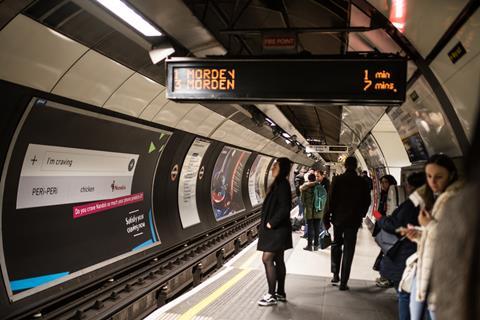Current funding deal runs out in March 2024
Transport for London (TfL) has issued a fresh call for confirmation of a long-term capital funding settlement from the government after last week saw the highest passenger numbers since the pandemic.
The number of journeys exceeded four million last Thursday for the first time in 2023, 7.6% higher than the same day last year.
Average midweek ridership on the Tube is now regularly above 3.7 million journeys and up around 6.5% compared to last year, with ridership on Monday and Friday now regularly above 3 million journeys a day.
While TfL said it can cover three quarters of its capital investment next year, it is seeking confirmation that the government will provide the remaining proportion that it says ministers have “consistently acknowledged that TfL will need” for major renewals and enhancements.

Multiple major capital projects were mothballed in the wake of the pandemic due to a funding shortfall caused by lower passenger numbers, including the extension of the Bakerloo line across south London, the Crossrail 2 project and the redevelopment of Vauxhall bus station.
Chancellor Jeremy Hunt did not confirm a long-term settlement for TfL in last week’s autumn statement, which focused on tax cuts and planning reforms.
>> See also: Funding woes sees TfL kick Crossrail 2 further into long grass
The transport operator said its situation is now “urgent”, and the capital is being forced to exist without the multi-year ‘London-style’ funding agreements that are being introduced elsewhere in the country, including in the West Midlands.
London mayor Sadiq Khan said London was “truly roaring back” after the pandemic, but the boom in passenger numbers needed to be supported by “sustained capital investment over multiple years with support from central government”.
TfL and the Department for Transport (DfT) struck their most recent funding settlement at the end of last summer after months of wrangling.
The deal, which funds TfL until March 2024, saw the government commit £1.2bn to the body’s capital investment programme, as well as ongoing revenue support if passenger numbers do not recover from the pandemic at the budgeted rate.
But the government’s contribution to TfL’s capital spending after this period has yet to be determined.
Earlier this month, a group of businesses including Mace and Arcadis wrote to Hunt urging him to commit to a further settlement of £500m to see TfL through 2024-25 and a longer term funding deal.
Without confirmation of a deal, the letter warned London risks “grinding to a halt” and the transport operator faced a “slow decline and greater costs in the future”.
A Department for Transport spokesperson said: “It is for the mayor to ensure TfL can deliver transport services in the capital.
“To support this, we have provided more than £6bn since 2020, on top of TfL also receiving just under £1.2bn in capital grant funding until the end of March 2024. The current funding settlement is a way to provide revenue protection.”


























No comments yet